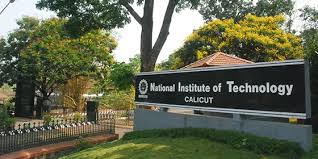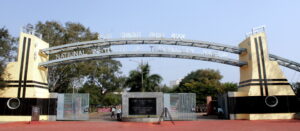Introduction
The National Institute of Technology Calicut (NITC) is a prestigious institution located in Kozhikode, Kerala. Established in 1961, it is one of the oldest and most respected NITs in India. NIT Calicut is known for its high-quality engineering education, research initiatives, and a vibrant campus life. This guide provides an in-depth look at the courses offered, fee structure, placement statistics, admission process for 2024.
Courses Offered
NIT Calicut offers a diverse range of programs across various disciplines. Here’s a detailed overview:
1. Undergraduate Programs:
- B.Tech (Bachelor of Technology): NITC’s B.Tech program is available in several branches, including:
- Computer Science and EngineeringElectrical and Electronics EngineeringMechanical EngineeringCivil EngineeringElectronics and Communication EngineeringChemical EngineeringEngineering PhysicsBioinformatics
- B.Arch (Bachelor of Architecture): The B.Arch program focuses on architectural design, planning, and construction. It prepares students for a career in architecture with a curriculum that blends theory and practical applications.
2. Postgraduate Programs:
- M.Tech (Master of Technology): NITC offers M.Tech programs in various specializations, such as:
- VLSI Design
- Structural Engineering
- Power Systems
- Data Engineering
- Thermal Engineering
- Communication Systems
- M.Sc. (Master of Science): Available in disciplines like:
- Applied Chemistry
- Physics
- Mathematics
- MBA (Master of Business Administration): The MBA program at NITC is designed to develop leadership and management skills. The curriculum includes core business subjects and electives in areas such as marketing, finance, and operations.
3. Doctoral Programs:
- Ph.D. (Doctor of Philosophy): NITC offers doctoral research opportunities across a range of disciplines, including engineering, sciences, and management. The PhD program is aimed at fostering advanced research and academic scholarship.
4. Integrated Programs:
- M.Tech + Ph.D.: This integrated program allows students to pursue an M.Tech followed by a Ph.D. The structure is designed to streamline the process of achieving advanced research credentials.
Fee Structure for 2024
The fee structure at NIT Calicut varies depending on the program and category of students (general, SC/ST, etc.). Below is a general overview:
1. Undergraduate Programs:
- B.Tech: The tuition fee for B.Tech students is approximately INR 1,000,000 per annum. Additional charges for hostel accommodation, mess fees, and other miscellaneous expenses amount to approximately INR 30,000 to INR 50,000 annually.
- B.Arch: The fee structure is similar to the B.Tech program, with additional charges for specialized materials and field trips.
2. Postgraduate Programs:
- M.Tech: The tuition fee for M.Tech students is around INR 60,000 per semester. Hostel and mess fees are additional, ranging from INR 25,000 to INR 40,000 per semester.
- M.Sc.: The tuition fee is approximately INR 40,000 per annum, with additional costs for hostel accommodation.
- MBA: The total fee for the MBA program is approximately INR 2,00,000 per year, excluding hostel and mess charges.
3. Doctoral Programs:
- Ph.D.: The fee structure for Ph.D. students is minimal, primarily covering registration and examination fees, totaling around INR 10,000 to INR 20,000 annually.
Placement Overview
NIT Calicut has a strong track record in placements, with many students securing positions in top companies across various sectors. The placement situation is outlined as follows:
1. Placement Statistics (2023):
- Average Salary: The average salary package for B.Tech graduates was approximately INR 12,00,000 per annum.
- Top Recruiters: Some of the leading recruiters include Google, Microsoft, Amazon, Tata Consultancy Services (TCS), Infosys, and Wipro. These companies conduct recruiting campaigns on campus on a regular basis.
- Internships: NITC emphasizes the importance of internships, and many students secure internships in top firms, which significantly enhance their employability.
2. Placement Support:
- The Placement Cell at NITC provides extensive support to students, including resume building, interview preparation, and organizing campus recruitment drives. They also facilitate interactions with industry professionals to help students understand industry expectations.
Admission Process for 2024
1. Undergraduate Admissions:
- B.Tech: Admission is based on the Joint Entrance Examination (JEE) Main conducted by the National Testing Agency (NTA). Candidates need to qualify JEE Main and participate in the Joint Seat Allocation Authority (JoSAA) counseling process for seat allocation.
- B.Arch: Admission is based on the National Aptitude Test in Architecture (NATA) scores. Candidates must meet the NATA cutoffs and participate in the counseling process.
2. Postgraduate Admissions:
- M.Tech: Admission is through the Graduate Aptitude Test in Engineering (GATE) scores. Candidates need to qualify GATE and participate in the counseling process.
- M.Sc. Admission is based on the Joint Admission Test for M.Sc. (JAM) scores.
- MBA: Admission is conducted through the Common Admission Test (CAT) scores, followed by group discussion (GD) and personal interview (PI) rounds.
3. Doctoral Admissions:
- Ph.D.: Candidates need to pass an entrance test conducted by NITC followed by an interview. UGC/CSIR NET or GATE scores can enhance the chances of selection.
Frequently Asked Questions (FAQs)
1. What is the average class size at NIT Calicut?
The average class size typically ranges from 30 to 60 students, depending on the program and branch.
2. Are there scholarships available?
Yes, NIT Calicut offers various scholarships based on merit and financial need. Scholarships are available through government schemes and private organizations.
3. What are the hostel facilities like?
NIT Calicut provides well-equipped hostels with separate accommodations for male and female students. Hostels offer amenities such as Wi-Fi, mess facilities, study rooms, and recreational areas.
4. Is there support for international students?
Yes, NITC provides support for international students, including assistance with accommodation and integration into campus life.
5. How is campus life at NIT Calicut?
Campus life is vibrant with numerous clubs, cultural events, technical festivals, and sports activities. The campus environment fosters both academic and personal growth.
6. How qualified are the faculty members?
Faculty members at NITC are highly qualified, with many holding Ph.D. degrees and having substantial research and industry experience. They’re dedicated to offering excellent instruction and guidance.
In conclusion, NIT Calicut stands out as a leading engineering institution with a comprehensive range of programs, a solid fee structure, and excellent placement opportunities. Its supportive academic environment and vibrant campus life make it a preferred choice for many aspiring engineers and technologists.




